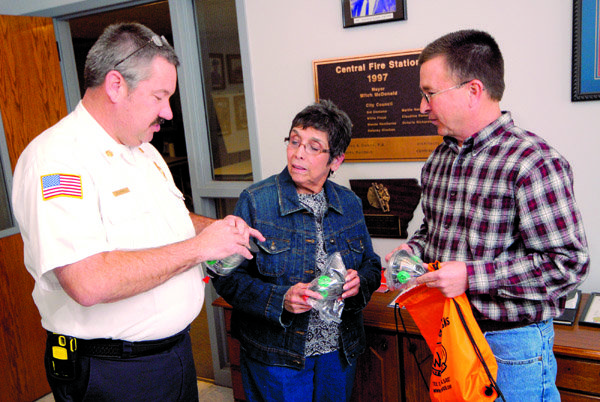A new Benton resident has presented Benton firefighters with equipment that will aid in the rescue and recovery of pets during fires.
Amelia Frazier, who moved to Benton from Jacksonville four months ago, made the donation after reading about the equipment in a magazine.
“I read an article that a community in Pennsylvania was raising funds for the equipment,” Frazier said, “but I lost the magazine.”
Frazier, who is a member of the American Humane Society, the American Society for the Prevention of Cruelty to Animals and other pro-pet organizations, did not let the matter get away with the magazine.
“I found that no one in Arkansas had the equipment, although I hear Little Rock’s fire department is getting some,” Frazier said. “So, I wanted to get it for the firefighters here.”
The equipment is a kit of plastic masks shaped to fit over the snouts of dogs. The masks can be placed over the heads of smaller animals, like cats, said veterinarian Scott Toms of the Congo Road Animal Clinic, who is instructing firefighters on the use of the equipment.
The kits cost $65 each, and Frazier purchased six of them, one for each first-responder team in the Benton Fire Department.
Frazier, who will retire from her job at the Skippy Peanut Butter plant in Little Rock before the end of the month, said the chance to save the life of an animal is worth the investment.
“I am trying to do what little I can,” she said. “If I can help one animal, it’s worth the price.”
Toms explained Monday to a class of firefighters that the masks might be harder to fit for flat-faced dogs such as bulldogs and pugs.
“Then just make sure the nostrils are covered, and seal the face as best you can,” he said.
The veterinarian told firefighters that the oxygen would be getting to the animals if they could see the chest rise and fall. He also told them that it is possible to administer CPR to the pets.
“For thick-chested dogs like bulldogs, you can be aggressive with the compressions,” Toms said. “But with slim-bodied dogs, even larger ones like German shepherds, it is easier to do and takes a lighter touch.”
Finding the pulse on an animal can also be tricky, Toms said. He suggested that listening for a heartbeat or checking the color of gums might be the best indication of cardiac problems in an animal.
Toms told the firefighters that lifesaving efforts that last more than five minutes are seldom successful, but he urged them not to give up, no matter the condition of a newfound pet victim.
“An animal can look bad. They can feel cold and show no real signs of life, but if you can get them warm and help them breathe, they can do pretty good,” he said.
Fire Capt. Wade Marshall commented in the class that animals who are revived can be disoriented and angry when they wake up and can become dangerous.
“They are not happy,” Toms said. “There can be some aggressive behavior, and they may try to bite and get away.”
He recommended wrapping an animal in a blanket to keep it still and to protect the firefighter working to save the animal.
District Chief William Ford said most small dogs can be as fierce as larger dogs. Toms said cats are more dangerous than large dogs.
“[Cats] can hang on and not let go,” he said.
Toms recommended the use of what is called a cat bag, which contains the cat’s body, with only the head remaining outside, so the cat can be given aid and oxygen.
Fire Capt. B.R. Besancon said firefighters deal with pets in about 80 percent of the department’s fire calls. He said pets are found when firefighters search homes, but they are usually too late to save the animals.
“They don’t want to leave their homes,” Marshall said. “In the stress and fear that comes with a fire, a dog will want to run back into the house.
Benton Fire Chief Chris Campbell thanked Frazier for the gift of the equipment and said firefighters always work to protect pets and get them out of a fire.
“It’s people first; then we always check for pets,” Ford said.
